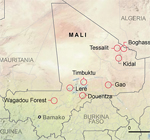TIMBUKTU, Mali — The bodies are buried here, in the side of a dune less than a mile outside this desert capital, dumped out of sight in a forgotten and uninhabited zone.
Except the wind undressed the grave.
It threw off the blanket of yellow sand to reveal a white piece of clothing. Soon the children of the shepherds who spend their days roaming the dunes with their flocks began talking about the two men buried there.
By the time journalists were led to the shallow grave 11 days after the two were last seen, the desert dwellers knew their entire biography: their names, their professions, the fact that they had been arrested by Malian soldiers on the same day that the French took control of Timbuktu from Islamic extremists. Most importantly, they knew their ethnic group — both were Arab.
Their deaths, as pieced together by The Associated Press from interviews with family members, residents and witnesses, as well as from an examination of the bodies, strongly suggest the two were taken away and shot dead by Malian forces, in reprisal against the city’s Arab minority.
Ever since al-Qaida-linked extremists seized control of Mali’s northern half last year, the international community has discussed launching a military intervention to free the occupied territory. For nearly as long, the United Nations as well as the United States has urged caution, in part over worries that Mali’s abuse-prone military could carry out acts of revenge against the ethnic minorities which were associated with the extremists — including Arabs.
Despite these warnings, France unilaterally launched a military operation exactly one month ago to take back the north, after the al-Qaida-linked fighters began pushing southward. The French swept through northern villages and towns, accompanied by Malian army troops, and liberated Timbuktu on Monday, Jan. 28.
It was around 10 that morning, as French troops in armored personnel carriers were still basking in the cheers of the crowds welcoming them, that Malian soldiers in pickup trucks sped up to the Nour El-Moubin Madrassa, a Quranic school. The headmaster of the school was a longtime Arab resident of Timbuktu, Mohamed Lamine. He was wearing a white boubou, a flowing robe like those worn to the mosque by the Wahabi, an ultraconservative sect accused of supporting the Islamic extremists.
His young wife was just returning from running an errand when she saw about six soldiers leading away her husband and a close friend, Mohamed Tidiane, a businessman who sold carpets imported from near the Algerian border.
